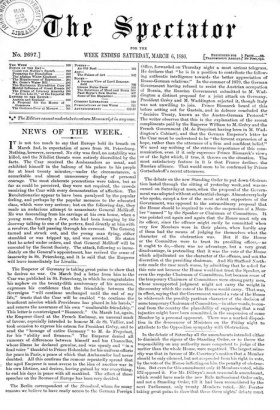The debate on the new Standing Order to put down
Obstruc- tion lasted through the sitting of yesterday week, and was re- sumed on Saturday at noon, when the proposal of the Govern- ment was adopted without substantial change. Almost everybody who spoke, except a few of the most ardent supporters of the Government, was opposed to the extraordinary proposal that the House should be required to rote the suspension of a Mem- ber " named " by the Speaker or Chairman of Committees. It was pointed out again and again that the House must rely on its officer, since the offence might easily be committed when very few Members were in their places, when hardly any of them had the means of judging for themselves what the character of the obstruction was. But if the House or the Committee were to trust its presiding officer,—as it ought to do,—there was no advantage, but a very great disadvantage, in pretending that it was the vote of the House which adjudicated on the character of the offence, and not the discretion of the presiding chairman. And Sir Stafford North- cote made the case much worse, by admitting that he asked for this vote not because the House would not trust the Speaker, or even the regular Chairman of Committees, but because some of the temporary Chairmen of Committees were strong party men, whose unsupported judgment might not carry the weight in the country which the vote of the House would carry. That was, in effect, saying that the Government wanted a vote of the House to whitewash the possibly partisan character of the decision of some temporary Chairman of Com m ittee,—in other words, to con- ceal from the country the plausibility of supposing that a real injustice might have been committed, in the suspension of some Member by a personal opponent. There was a marked disposi- tion in the demeanour of Ministers on the Friday night to attribute to the Opposition sympathy with Obstruction.


































